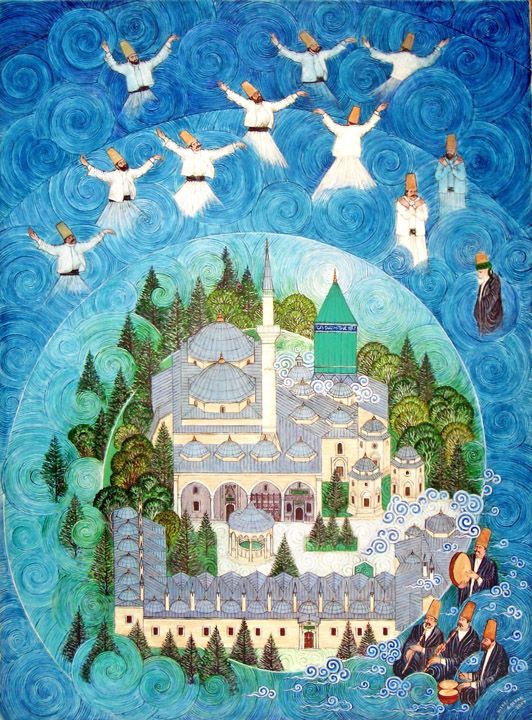
One of the most read and quoted Persian poets of the 13th century, Mevlâna Mohammad Jalal al-dîn Rumi, known as Rumi was a savant and mystic. Born in Balkh region, today’s Afghanistan (1207-1273), he and his family moved to Konya, Turkey after the Mongol conquest. Soon after his settlement in Konya, mystics, and Sufi dervishes gathered around him to benefit from his spiritual and intellectual knowledge. The spiritual life was embedded in the daily material life of the dervishes. Their gatherings were accompanied by spiritual music and dancing. It is during this period he is called “ Mevlâna” – meaning “our master”.
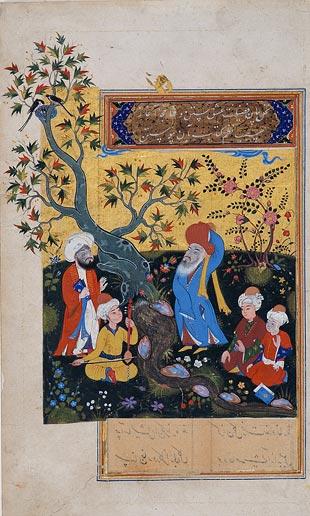
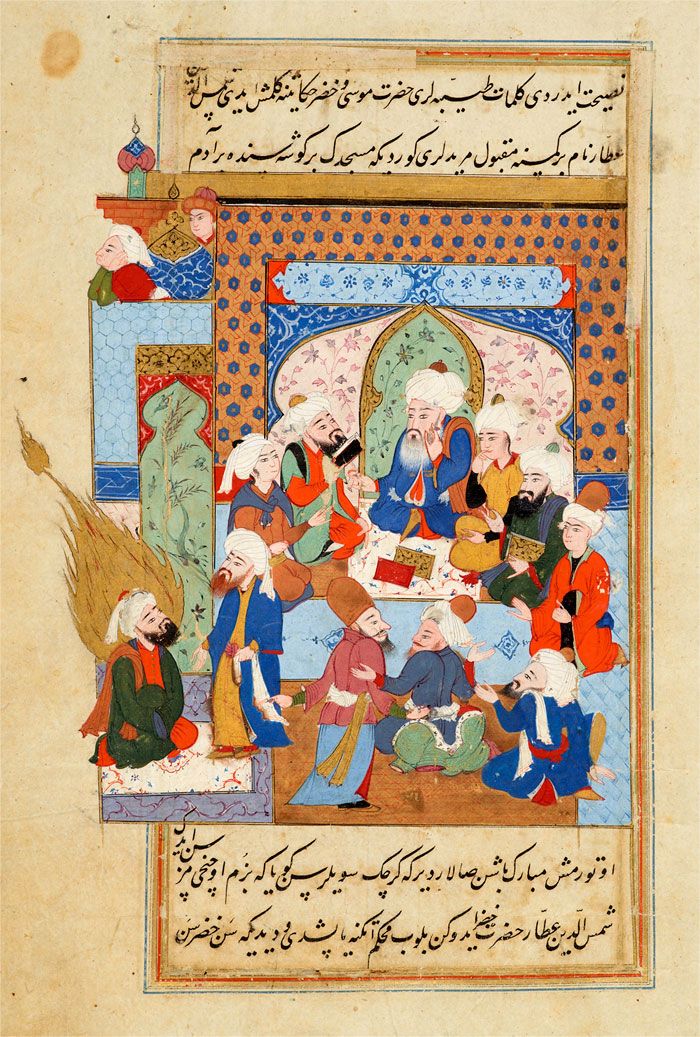
In his quest for the “Truth” and the union with the “One ”, Rumi ’s turning point is his encounter with a wandering dervish, Shams, which means “the sun”. Shams becomes Rumi ’s spiritual guide and paves the way for Rumi to advance in his spiritual discoveries and ultimately to reach the stage of divine love. In his presence, the eye of the heart opens for Rumi through which he can sees the reflection of the “One” in Shams. Falling in love with that reflection essentially opens the door to the stage of divine love for him.
The eye of the heart which is seventy-fold and of which these two sensible eyes are only the gleaners.
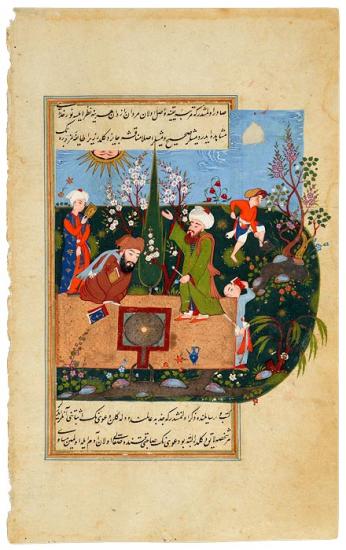
He writes about experiencing divine love :
Love cannot be written in a treatise on philosophy, love can only gush forth, spring up.
For love to find its way and to spring up :
Your task is not to seek for love, but merely to seek and find all the barriers within yourself that you have built against it.
One has to make room for love to enter, and that entails removing the barriers of the ego from oneself :
Set your life on fire. Seek those who fan your flames.
After the mysterious departure of Shams, Rumi starts writing his magnific Mathnavi, comprised of 25 700 rhyming couplets, vibrant with harmonious melodies of the Persian language, and bearing profound meanings. This seminal corpus with its rich allegories, animated tales, miracles, and mystical experiences, stands out to be a precious source of wisdom. For Rumi, the only language to speak of this mystical experience is poetry to capture the blazing flashes of light. He beautifully describes the source of his inspiration :
In your light, I learn how to love.
In your beauty, how to make poems.
You dance inside my chest,
Where no one sees you,
But sometimes I do,
And that sight becomes this art.
The two miniatures describing the miracles from the daily life of Rumi :
In a place and time where dogs were not regarded with high esteem, Rumi praises the dogs who were listening to his speech in a market place, for their attention and understanding, He further honors them by stating that they are kin to the dog named Qitmir, the protecting guardian of the “Seven Sleepers”, who had to escape death sentence during the reign of the Roman Empreror Decius because of their faith in Jesus.
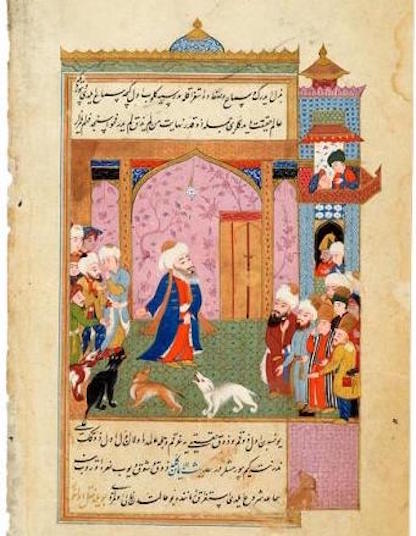
While Rumi was studying with a few of his students, a cow, having just escaped from the butcher’s hand, wants to take refuge in Rumi, and lays down putting his head his head in front of Rumi’s feet. Thereupon, Rumi asks the butcher to let go of the cow and the butcher accepts. The cow leaves the square and he is never to be seen there again.
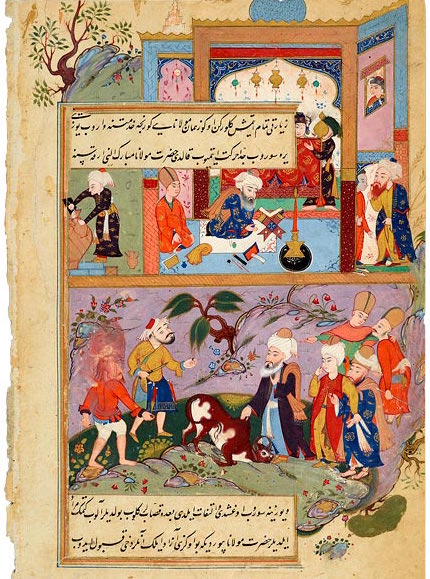
Thirty years pass since the departure of Shams, and the majestic Mathnawi is completed. Time has come for Rumi to leave this world and to meet with his Beloved. His followers and close ones, people from all religions and circles are gathered around his funeral, making their farewell odes and blessings to their beloved tutor, dancing mystic and the trailblazing poet.
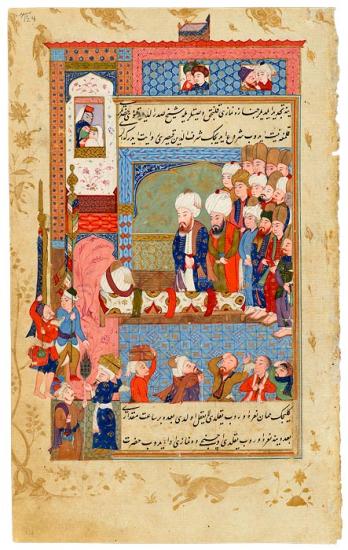
Having fulfilled his life on this earth, Rumi approaches his departure in contentment and serenity, waiting to reunite with his Beloved, he writes in his sublime tone :
Keep your heart pleasant, patience attains
For the lovers’ prayer holds everywhere
While unhappiness does not remain but pass
Have no doubts –the wheel of fortune turns.
Duygu Bruce
Miniature images :
https://www.themorgan.org/collection/treasures-of-islamic-manuscript-painting
Translations of poems by A.J. Arberry







